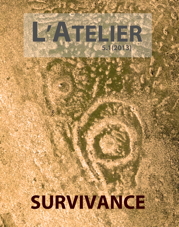Material Means: Forms of Precarious Life in Jean Rhys's "Good Morning, Midnight"
Keywords:
Rhys, Jean, Precariousness, Survival, VulnerabilityAbstract
This paper addresses the representation of precarious life in Jean Rhys's interwar novel, Good Morning, Midnight as determining the very structure of the novel and its staging of time and space. It contends that the very exposure of the "body of need" serves as a cornerstone of a critical enacting of power structures, through the medium of a liminal voice who never tires of probing discourses in relation to responsibility. The paper disputes Judith Butler's ehtical stance as expressed in her essay Precarious Life and its Levinassian legacy, and rather suggests that ethical responsibility is ever and always to be conquered.
Il s’agit dans cet article d’interroger les modes par lesquels l’expérience de la vie dans le roman de Jean Rhys Good Morning, Midnight est rendue comme le maintien de conditions de survie, que l’on peut approcher comme une exposition à une extrême précarité. Il est frappant de voir alors comment cette notion, ou ce concept de précarité se révèle alors être la pierre de touche de la représentation du temps, des relations de pouvoir, des discours et de questions éthiques. Mais le dialogue proposé dans cet article entre les formes littéraires données à cette expérience de la précarité et l’usage de ce concept dans la pensée de Judith Butler et d’Emmanuel Lévinas remet en cause la proposition selon laquelle la vulnérabilité pourrait être figurée ou incarnée parle Visage et redéfinit ainsi l’éthique comme l’exigence d’un questionnement sans fin.
Published
Issue
Section
License
- Work submitted for publication must be original, previously unpublished, and not under consideration for publication elsewhere. If previously published figures, tables, or parts of text are to be included, the copyright-holder's permission must have been obtained prior to submission.
- Authors of accepted manuscripts will assign to L'Atelier the right to electronically distribute their article, or publish it in any form (Internet, CD ROM, printed copy) but authors will retain copyright and, after the article has appeared in L'Atelier, authors may republish their text (in print and/or electronic form) as long as they clearly acknowledge L'Atelier as the original publisher.


